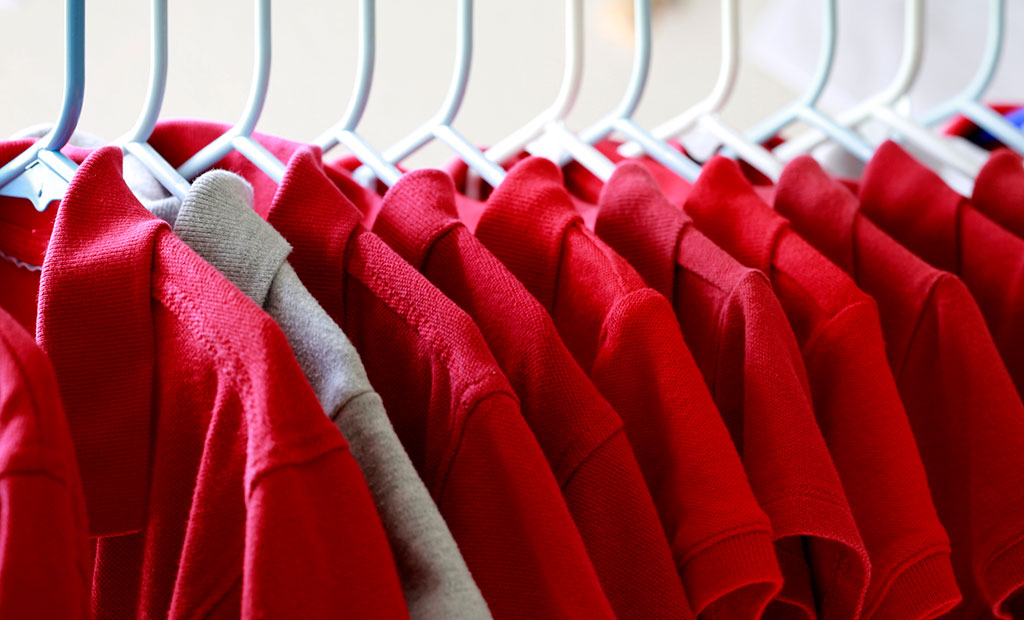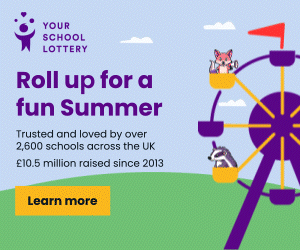Why sell uniform?
The cost of school uniform can be a burden to parents, yet many children grow out of their uniform long before it reaches the end of its life. A poll by Sainsbury’s revealed that a child will wear an average of 480 items of uniform clothing over the course of their school days and that parents will spend about £6,000 in total on school uniform. Offering a second-hand uniform service at your school helps parents with the cost of uniform, while at the same time raising money for the school and keeping perfectly usable items out of landfill. Expanding your service to include textile recycling or finding creative ways to reuse what you can’t sell will further lessen the environmental impact of uniform production and disposal. ‘Parents love a bargain, and they want to do their bit for the environment too, so this kind of service is win-win for all involved,’ says Nathalie Dawson, PTA secretary at St James’ CofE Primary School in Cheltenham.
A well-run second-hand uniform operation:
- helps all families get school uniform at a bargain price
- provides a way for parents to pass on items they can no longer use
- raises money for the school – even if fundraising isn’t the main focus
- creates a culture of reuse and mend.
If you have families in need, remember many people prefer to pay a token amount for a bargain than have to accept charity.
Appoint a uniform coordinator
Uniform coordinator is an ideal position for someone who is organised and methodical. Could you find someone to take on this role from outside the parent community, such as a grandparent who enjoys working with textiles?
The online sale
PTA secretary Anna George started a Facebook group to sell preloved uniform online at Archbishop Rowan Williams VA school in Portskewett (202 pupils).
‘Our second-hand uniform used to be stored in big bags, which had to be sorted each time we got them out. Sales were time-consuming and didn’t raise very much. I have strong anti-waste values and I was looking for a way to help while working full-time. I decided to use my digital communications skills to set up a “Preloved Uniform Group” linked to the PTFA Facebook page.
Parents can either drop uniform into the office or give it to me on the playground. Although we do remind everyone, there’s a strong recycling culture here and people know they can donate their clean, preloved uniform. If I receive an item that’s torn or stained, I put it in a rag bag, which the local charity shop accepts for textile recycling. Lost property also comes to us once a term. I wash it and try to find the original owners; otherwise, it goes into the sale. I have three storage bags of uniform for sale that I keep in my dining room.
To join the Preloved Uniform Group, parents have to answer a question. The school also helps us check that applicants have a genuine connection to the school. People can see a photograph of an item with a description and then comment or message me directly. Once the sale has been agreed, I give the uniform to the secretaries, who put it into the correct child’s bag to be taken home. I charge a suggested donation of £1 and people pay at the office.
Each year, the school holds a coffee time for parents of new starters. Last year, I went along to promote the Preloved Uniform Group and let parents know how they could join. We then arranged convenient places to meet where I could drop the uniform off.
It took quite a while to set up the group and to sort through the old stock, but now I spend an average of half an hour a week promoting posts and liaising with my customers. Last year, we only made about £50 from uniform sales. This year, we’ve made that much in one term.’
- Love your pre-loved school uniform
- Make bunting from old uniform
- Find labelling suppliers in our directory
The playground sale
PTA secretary Nathalie Dawson and preloved uniform sale coordinator Rachel Reisner hold seven preloved uniform sales a year in the playground at St James’ CofE Primary School, Cheltenham (412 pupils).
‘We started using the word “preloved” instead of “second-hand” about three years ago as it has a more positive connotation and has helped people understand what we’re trying to achieve. Our sales are eagerly anticipated and held at the start of every half term. We also hold a special sale at the end of the summer term, known as the “Get ready for September” sale. Parents can see we have carefully selected only uniform that’s in great condition and that we keep it well and display it neatly. For maximum visibility, we set up two tables near the school entrance so everyone walks past them. Sales start shortly before the end of the school day and last about 30 minutes.
We try to make things as simple as possible for busy parents. Items are neatly folded (Marie Kondo-style!) in large, clear boxes and labelled in size order. We provide laminated price lists so people can see the prices clearly (and to save paper). We sell branded jumpers and cardigans for £2.50, summer dresses cost £2, and branded PE T-shirts, polos and all grey uniform sell for £1 an item. We only accept cash and take £80-£150 per sale, generating around £1,000 a year for the school.
Sales are promoted in our PTA newsletter and on our three noticeboards. They are also listed on our PTA website and posted in our Facebook group. We recently invested in a waterproof two-metre banner displaying the words “Preloved Uniform Sale This Week”, which we attach to the school gates. As a final reminder, parents are sent a text on the week of each sale.
Donations are accepted all year round into the PTA drop box in the school foyer. When the box is full, we empty it, sort the items and store in the appropriate place. We accept all uniform and PE kit, whether branded or plain, and ask that everything is washed. Before each sale, we check lost property and add unlabelled items to the sale.
To encourage people to label their uniform, the PTA has partnerships with three labelling companies, Stamptastic, Stikins and Mine4Sure. All three donate to our PTA when people make a purchase using our school’s unique code. Unsaleable, non-branded uniform is stored in the shed ready for our next Bag2School textile collection, and PTA helpers have turned some of it into “jumper bunting” for using as decoration at PTA events. Our shed is tidy, waterproof and secure, with sturdy shelving for storage. After each sale, we put our carefully labelled boxes of uniform back on the shelves so everything is ready for next time.’
The school shop
PTA chair Lynn Gadsby set up a dedicated uniform shop at Tonbridge Grammar School in Tonbridge, Kent (1,182 pupils).
‘We decided to overhaul our second-hand uniform service last year. The school allocated us an area for a shop, we agreed to spend £500 of PTA money to refurbish it, and we use PTA Events to sell online. One parent donated £200 towards a washing machine and another answered our call for a laptop. We bought an airer, iron, ironing board and kettle, as well as storage units from IKEA. The shop is open every Tuesday and is staffed by four PTA volunteers on a rota basis. Parents are happy to buy from our shop because everything is in such good condition and is well-displayed. If an item comes to us in worn condition we give it to the school, as they maintain a stock for parents who genuinely can’t afford uniform, and they also keep a box of old clothing in case of accidents. The PTA also keeps many of the unsaleable items for our fundraisers: we make Christmas decorations from old uniform, and we have made PTA bunting from old school dresses.
Prices in the shop are around a third of the cost of new items. Students are encouraged to try things on, and parents can order using our online shop, where we accept credit cards and Stripe. Volunteers pack up the orders, and they are given to the girls to take home. PTA members who attend meetings and help out get a code for 25% off in the shop. Our volunteers work hard, and last year we made £6,500 just from selling uniform. We opened the shop on the Year 7 induction day and made £1,500 from new parents alone.’
The community shop
Siobhan Wilson runs Smarter Uniforms, a community second-hand uniform shop in Brighton.
‘Smarter Uniforms is a social enterprise based on recycling unwanted school uniform and re-selling it at a lower cost to minimise waste and raise funds for schools. It is operated from a small unit at the back of my ethical clothing shop in Brighton. We currently sell uniform on behalf of seven partner schools and parents from any local school can donate branded or plain uniform to us. We also run a service providing free uniform to families in hardship, based on referrals from community organisations.
We’re open 11am-5pm, Monday to Saturday, which is helpful for working parents who aren’t on the playground. Uniform is priced at about a third of the original cost. Parents can use our loyalty scheme where they collect stamps every time they donate, and these can be redeemed when they buy from us. Uniform donations are divided into four groups: good-quality uniform is washed and displayed for sale in the shop; repairable uniform is fixed by our team of volunteers (how much we do depends on how many volunteers we have); non-uniform is donated to charity; and unsaleable items are sent to a responsible textile recycling company.
We have some storage space underneath the shop, but so much is donated to us that we also rent an off-site storage unit.
When a school partners with Smarter Uniforms we place a collection box in their reception area, then we collect it when it’s full. We also hold a donation day at the end of the summer term where we request uniform from leavers and ask for donations to a local food bank. The school receives 70% of the money raised from selling branded items, leaving PTAs more time to work on other fundraising initiatives.’








.gif)
